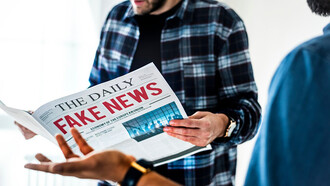Wars do not end; human beings continue to kill each other as they have done for centuries, while the strength and power of a few determine the fate of many. We are currently witnessing genocide in Gaza carried out by the Israeli government, three years of Russia's war of aggression in Ukraine, direct confrontation between Israel and Iran, a new clash in Punjab between India and Pakistan, US bombing of Iranian nuclear power plants, attacks in Yemen, Syria, and others that no longer attract the attention of the international press. In all these conflicts, international law and United Nations norms have been trampled underfoot. We are facing a scenario of insecurity and uncertainty that affects stability, development, and cooperation.
A few months before the end of World War II, in February 1945, the three main world leaders who designed the international order that would be born with the United Nations Charter and which still governs us today met for a week in Yalta, Crimea, then part of the Soviet Union: the President of the United States, Franklin D. Roosevelt; the British Prime Minister, Winston Churchill; and Joseph Stalin, General Secretary of the Soviet Communist Party.
Prior to Yalta, since their first meeting in Moscow in 1942, the leaders had met in Casablanca, Cairo, and Tehran to follow the course of the war and outline the world that would emerge once the conflict was over. Once Germany surrendered, they met again for the last time in Potsdam, announcing what was to come: the Cold War. France, with General Charles de Gaulle, did everything possible to be invited to all the meetings, but was not allowed to attend. At Yalta, the final division of Germany, Poland, and all of Eastern Europe had been decided, leaving it in Soviet hands. The Soviets would not fulfill their commitments regarding free and democratic elections in the countries liberated by the Red Army. The joint positions previously agreed upon by Roosevelt and Churchill failed to prevail because Soviet troops were only days away from taking Berlin. Churchill's dream of maintaining his colonies, especially India and the Suez Canal, did not last, and within a few years, decolonization would come on the one hand and the Iron Curtain would fall in Eastern Europe on the other.
Who are today's leaders who could attempt to reduce the main conflicts and tensions in order to design a period of relative peace and security and outline a new world order? There are undoubtedly three: the president of the United States, Donald Trump, who is governing for the second time the country which is today the world's leading military, economic, technological, and cultural power. His recent show of force in Iran has made things clear. Chinese leader Xi Jinping, who for 12 years has led the world's second-largest power, with more than 1.4 billion inhabitants, without becoming directly involved in any military conflict, and reiterated the call for peace. The third is Russian President Vladimir Putin, who since 2012 has ruled the largest nation on the planet, whose country has been at war for three years, and which Europe fears will spread to other countries.
It is true that today's conditions are totally different from those of 1945 and that there are other actors who would like to be part of any eventual negotiation, such as India or the European Union, but this seems difficult. What should be negotiated? Reasonable agreements in the Middle East ensuring the creation of a Palestinian state that guarantees the security and interests of Israel, Lebanon, Syria, and Yemen, among others. Likewise, consider those of regional powers such as Turkey, Iran, and Saudi Arabia. Try to resolve the issue of Taiwan, which is non-negotiable for China, as the United States is well aware, and which continues to be a source of tension. The sooner it is resolved, the better for security in Asia. Attempt to address the causes of immigration that threaten the stability of some countries, with collective and supervised cooperation and resource utilization programs, especially in Africa. Stop the war in Ukraine, which is another complex issue and where Putin has found an ally in President Trump, who, as Henry Kissinger and George Kennan said a few years ago, seems to agree that it was unnecessary to extend NATO bases to Russia's borders.
Putin has shown no intention of stopping the war with NATO-Ukraine. It can be taken for granted that he will not withdraw from Crimea or the territories he already occupies. Curiously, Trump seems to understand this better than his European allies, assuming that the Black Sea is Russia's natural outlet to the Mediterranean, through which a significant percentage of its grain, fertilizer, and oil production flows, along with Sevastopol, the port for part of its fleet. Putin appears to have convinced the US president that he will not accept Ukraine's accession to NATO. It would be the fourth country bordering the Black Sea, alongside Romania, Bulgaria, and Turkey, which surround Russia with NATO military bases. As geopolitical experts would say: you have to know your history, look at the maps, and consider the sources of natural resources.
Catherine the Great occupied Crimea in 1783, taking it from the Ottoman Empire. Russia was defeated in the Crimean War (1853-1856) against a coalition led by England under Lord Palmerston, which prevented it from taking Istanbul and the strategic Dardanelles Strait, still controlled by Turkey today, which threatened British commercial dominance of the seas. Palmerston gave us a master class on national interest when he pointed out that England “has no eternal allies or perpetual enemies. Our interests are eternal and perpetual, and our duty is to watch over them.”
Therefore, it seems that geopolitics is what prevails today in the game of interests between the great powers. “It's geopolitics, stupid,” we would say in 21st-century language. The United States, or President Trump, has achieved what seemed impossible a few months ago: increasing NATO members' defense spending from 2% to 5% of GDP. This is a personal success for the president. In doing so, he has secured the market of these countries, which will buy US weapons because the European industry is unable to meet such a large demand. Trump recently refused to reaffirm Article 5 of the NATO treaty, which states that an attack on one member is an attack on all. In other words, the US would not necessarily defend Europe in the event of an attack, forcing European countries to arm themselves. In other words, Europeans would be better off negotiating with Russia to ensure the independence of the Baltic states and Poland.
A new world order should defuse the main sources of tension and ensure a period of peace in the most sensitive areas today. China could be rewarded with Taiwan and other islands in the China Sea, which it will obtain sooner rather than later. Russia, which surely covets Kiev for historical and cultural reasons, will have to convince President Trump to achieve this, but after everything we witness every day, nothing seems impossible. The United States, which considers Israel to be just another state of the Union, will seek to increase its influence in the new Middle East. It will attempt to denuclearize or at least suspend Iran and its nuclear ambitions for a time. Washington will also seek to reformulate international trade rules or make tariff asymmetries the norm in order to reduce its trade deficit. For now, it has already secured trillions of dollars in arms sales to its allies. Europe will have to work very hard if it wants to be a respected military force, or it will continue to be a secondary player in this story due to its many disagreements and political differences between its countries.
Neither Trump nor Putin seem to consider the European Union a relevant player, and the Chinese are just watching. The question that remains is whether the United Nations system can be reformed, especially the composition of the Security Council and its functions, which today are sadly lacking, with the secretary general playing no role whatsoever. The lack of global governance makes it very difficult to meet goals to truly curb climate change, protect the oceans, and massively develop renewable energy sources. Likewise, ongoing wars have demonstrated the ineffectiveness of international law, which seems to collapse every time the United States, Russia, or another power decides to ignore the rules established at the time of the founding of the United Nations, an organization that is celebrating a sad 80th anniversary. The sooner the world's leaders meet, the sooner we can begin to outline a period that guarantees peace and security for the new generations who must live in a world designed with the logic of 20th-century power.















